Farrinstitute is reader-supported. We may receive commissions on purchases made through links on our site.
Whether you prefer green tea, a cup of coffee or Pepsi, if you’re drinking any of these beverages or supplements, chances are you want a little jolt of alertness that the best caffeine offers.
Caffeine supplements are there to provide a temporary boost in energy when you’re working or studying overtime, or have an athletic performance ahead. The caffeine in a pill or supplements will help you achieve the best lift, but too much caffeine could lead to unsafe side effects.
It’s important to learn about the benefits of caffeine and side effects of caffeine supplements and how the best caffeine pills work including the top choice on the products list — Performance Lab Stim.
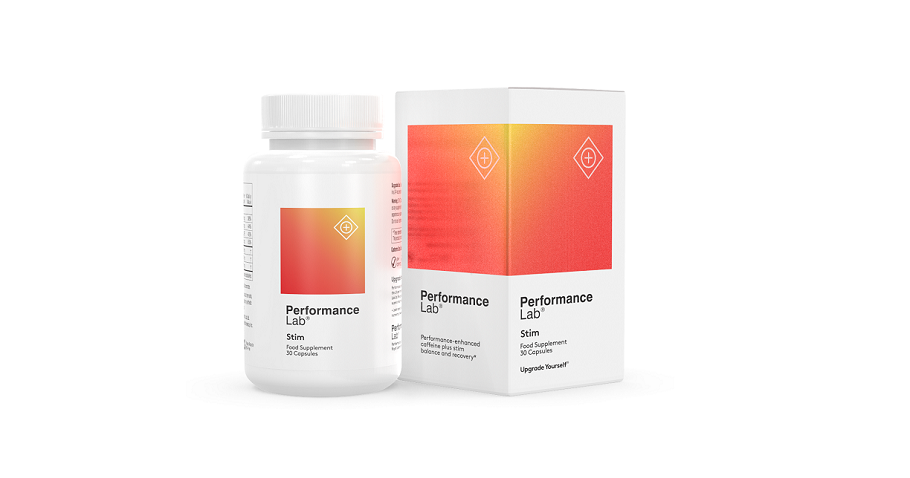
The Performance Lab company brings us another one of its supplements, Performance Lab Stim with caffeine.
This caffeine supplement also contains B vitamins and other minerals for the best energy and concentration, among other positive side effects. Because of that, the caffeine dose in Lab Stim supplements is lower than others, but you can take a single capsule up to five times daily.
Out of all the products and caffeine pills on the list, Performance Lab Stim supplements come in at the top as a caffeine supplement with a superior reputation and high-quality standards.
Lab Stim supplements are safe for vegans and those with other sensitivities, too, as Lab Stim is allergen and gluten-free. The Lab Stim capsules shouldn’t lead to any negative side effects in this regard.
Performance Lab Stim supplements contains seven natural ingredients:
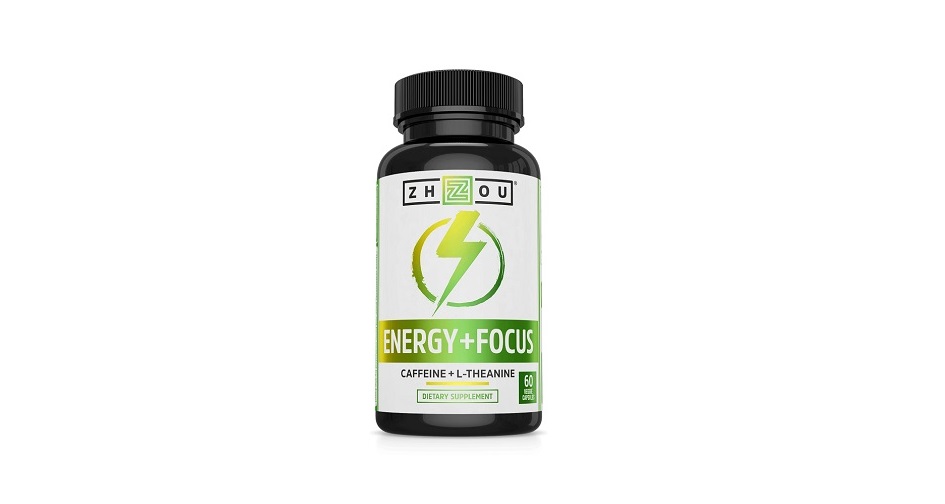
This energy caffeine supplement contains a proprietary two-to-one ratio of L Theanine and caffeine. The combination of these ingredients creates a “synergistic” effect, boosting energy and mood better than one could do alone [2]. The best ratio may also help reduce the jittery side effect that the best caffeine creates.
Zhou Energy + Focus features the following:
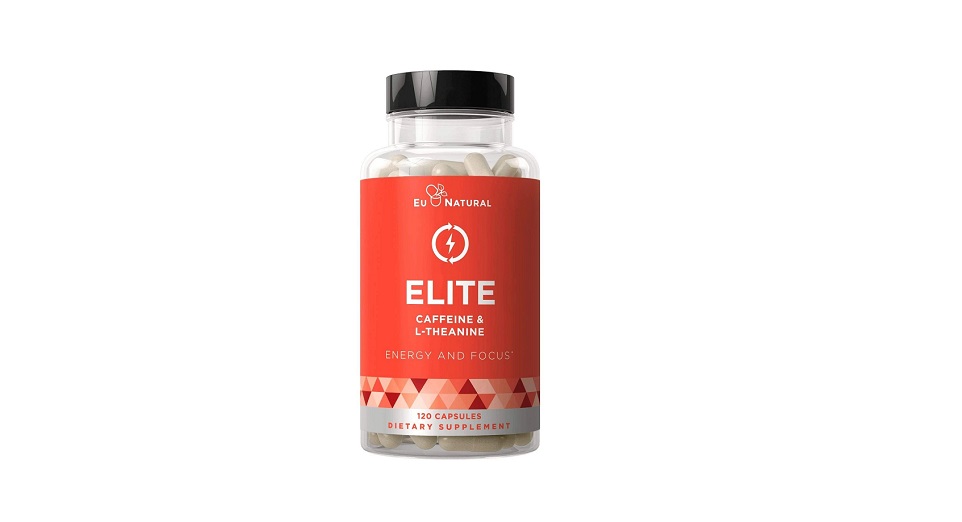
Similar to the caffeine pills above, this caffeine supplement contains the caffeine and L Theanine combination to provide you with the best focus. The company makes these products in FDA-approved facilities and the capsules are vegetarian-friendly.
Eu Natural offers a 90-day 100 percent money-back guarantee in case you’re unhappy with your purchase for any reason.
The caffeine supplement includes:
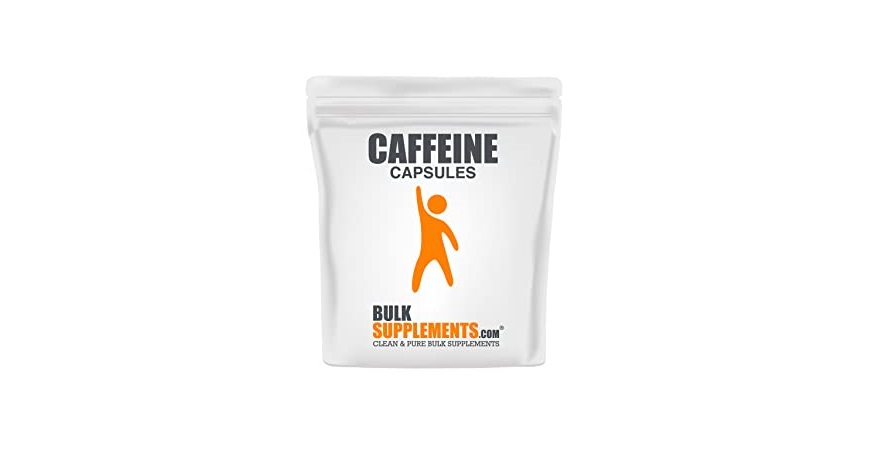
Bulksupplements brings us the most straightforward caffeine pill on the list. These supplements contain caffeine only, and you can choose between gelatin or vegetarian varieties.
The company produces the caffeine supplements in the best GMP-certified facilities, which means it follows strict standards and regulations.
Bulksupplements caffeine supplement features:
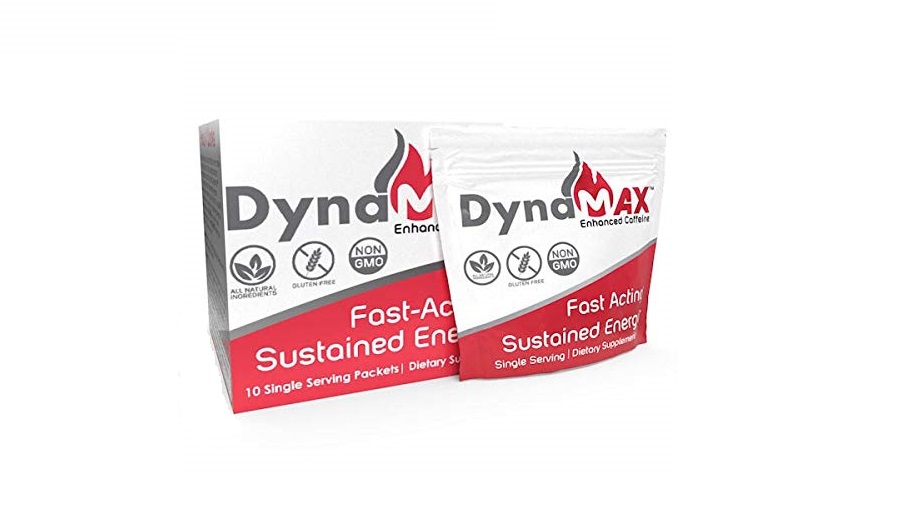
These caffeine pills come from the Natrium Health company and they’re labeled as a slow time release option for sustained energy throughout the day. This indicates the best side effects of the supplements will linger longer, but may be less intense due to the time release mechanism.
DynaMAX contains the following:
The best caffeine pill will feature a mix of natural ingredients including B vitamins and L Tyrosine to maximize the best side effects of caffeine safely. These substances may also bring added benefits such as relaxation and clarity of mind to boot. A natural version of caffeine versus a synthetic variety is also superior in caffeine pills.
Performance Lab Stim is a terrific example of this. It contains the following benefits, which happen to be more than the other caffeine pills on this list:
Riboflavin as Vitamin B2 at 500 mcg is an advantageous B vitamin. It’s used to support individuals with various medical conditions such as sepsis, due to its anti-inflammatory and antioxidant properties [3]. This indicates it might be useful for aging people or those suffering from swelling of any kind.
Vitamin B6 at 750 mcg plays various roles in the body including the support of cognitive development (specifically neurotransmitters) and metabolism [4]. As part of its function with cognition, it may help reduce the side effects of depression and boost one’s mood.
Folate (Vitamin B9) at 167 mcg is another B vitamin that comes with positive side effects. This one helps the body make energy from food and functions in the repair process of DNA, keeping blood cells healthy [5]. It could be useful for anemic individuals for this reason, as it supports the production of iron. Vitamin B9 may also help fight low energy levels.
Vitamin B12 at 2 mcg is a well known B vitamin, due to its energy giving abilities. It compliments the function of folate, as well, and may be useful in supporting individuals with cardiovascular conditions [6]. Furthermore, it helps clear mental confusion, which helps those looking for the best boost from a caffeine supplement.
Natural Caffeine (from Coffea Robusta Seeds) at 50 mg is a common type of coffee that hails from Sub-Saharan Africa. Companies often use these coffee beans in instant and espresso coffee varieties. This is due to the higher levels of caffeine in the best seeds [7].
The benefits of caffeine may also include weight loss as it suppresses appetite and provides energy. It could also help in getting rid of headaches.
Suntheanine L Theanine at 100 mcg is a common ingredient in nootropics and caffeine supplements. It’s also often found in green tea. This green tea amino acid has a positive effect on stress and the consequences of the condition, such as anxiety and restlessness [8]. It promotes relaxation without the sleepiness attributed to many relaxants.
Ajipure L Tyrosine at 250 mcg is another amino acid that helps with the production of dopamine and noradrenaline. These two neurotransmitters play a vital role in mood regulation, reducing stress anxiety levels. L Tyrosine may increase mental alertness and clarity and be beneficial for aging individuals [9].
How caffeinated pills can help you focus best all boils down to brain chemistry. The same works for the caffeine you find in coffee beans, the benefits including the energy from caffeine follow.
Caffeine has a similar structure to adenosine, which is a chemical that exists in human cells. These two chemicals function quite differently, though. Adenosine suppresses the central nervous system by slowing down the activity between nerves, promoting sleepiness.
However, because the brain recognizes the similarity in structure, caffeine then binds to the adenosine receptors [10]. Since caffeine takes up space, adenosine no longer has room to fully function. This means that instead of the nerve cell activity slowing down, it speeds up.
This fast-paced movement between nerve cells is what causes the energy and focus associated with caffeine in pills. People who have consumed caffeine pills for a long time have done so for this reason.
The short answer is “no”, 200 milligrams isn’t too much caffeine.
On average, an 8-ounce cup of the best drip coffee has around 100 milligrams of caffeine. The best cup of green tea has around 35 mg, so the effects are less, but this serves as a contrasting example.
200 mg per day is the recommended maximum for pregnant women, indicating that it’s probably a safe amount for your average individual to enjoy the benefits of caffeine. Most caffeine pills and supplements feature between 100 and 200 mg.
Do keep in mind that if you suffer from any of the following, you may want to limit your caffeine pill intake more than most people to avoid unwanted side effects of caffeine:
The best benefits and effects of caffeine come with evidence, backed by science. Multiple studies point to taking caffeine as useful for various cognitive functions including focus, energy, and memory performance [11], [12].
This evidence correlates with a moderate caffeine intake of up to 300 mg of caffeine daily. Beyond this dose, with too much caffeine you may suffer from agitation, irritability, and nervousness.
If you choose to take caffeine pills or caffeine supplements for support, on top of coffee, do watch your intake to avoid any of the scenarios in the list above. The best caffeine supplement shouldn’t cause the opposite of your goal here.
Caffeine pills themselves don’t lead directly to weight loss but other benefits of caffeine can help. A caffeine supplement may affect weight loss as it suppresses one’s appetite and increases thermogenesis, like coffee [13]. Thermogenesis is the process of a body heating up, which in turn could increase metabolism and fat oxidation.
Studies are inconclusive as to how much of the best caffeine you need for this to occur. Companies include caffeine in many weight loss supplements for this reason, though.
Many athletes use caffeine or consume a caffeine pill or caffeine supplement like Lab Stim before physical performance for multiple reasons. One is the overall energy you get from taking caffeine pills or drinking coffee. Secondly, caffeine may help in muscular activation, increasing power and endurance [14].
A caffeine supplement or caffeine pill also has positive effects on adrenaline, which is the “fight or flight” hormone. An uptick in this hormone, related to stress in other scenarios, may improve performance levels, as well [15].
In certain sports and games, officials ban caffeine and caffeine pills for the advantages it provides consumers over those who don’t take a caffeine pill or supplement as part of their routine. This, however, is limited to professional scenarios and doesn’t include your typical coffee in the morning.
If you’re looking to up your performance beyond coffee, consuming one of the best caffeine supplements could help you get there due to its effects on muscle usage, energy, and more.
The best caffeine pills and products offer energy and mental focus in a safe and well-rounded manner. Whether you’re taking a mix of caffeine and L Theanine or the best caffeine supplement that features even further benefits, a caffeine pill may help you study, work, and exercise with better athletic performance.
Make sure to stick with a natural form of caffeine pills, not synthetic. The best caffeine supplements or pills will feature the former for energy and concentration.
Performance Lab Stim is the top pick here for a caffeine pill. This Lab Stim caffeine pill contains many beneficial ingredients per serving, such as B vitamins, amino acids such as L Tyrosine, a natural, pure caffeine derivative and more. This company also adheres to rigorous standards of Lab Stim pill production, proving a safe and well-reputed manufacturing process.
{
“@context”: “https://schema.org”,
“@type”: “BlogPosting”,
“mainEntityOfPage”: {
“@type”: “WebPage”,
“@id”: “https://farrinstitute.org/best-caffeine-pills/”
},
“headline”: “Best Caffeine Pills”,
“description”: “Whether you prefer green tea, a cup of coffee, or Pepsi, if you’re drinking any of these beverages or supplements, chances are you want a little jolt of alertness that the best caffeine offers.”,
“image”: “https://farrinstitute.org/wp-content/uploads/2021/03/Best-Caffeine-Pills-1.png.webp”,
“author”: {
“@type”: “Person”,
“name”: “Nadine Rabchenok”,
“url”: “https://farrinstitute.org/author/nadine-rabchenok/”
},
“publisher”: {
“@type”: “Organization”,
“name”: “Farr Institute”,
“logo”: {
“@type”: “ImageObject”,
“url”: “https://farrinstitute.org/”
}
},
“datePublished”: “2020-12-13”,
“dateModified”: “2023-05-26”
}
1. Cappelletti, Simone, et al. “Caffeine: Cognitive and Physical Performance Enhancer or Psychoactive Drug?” Current Neuropharmacology, Bentham Science Publishers, Jan. 2015, www.ncbi.nlm.nih.gov/pmc/articles/PMC4462044/.
2. Owen GN;Parnell H;De Bruin EA;Rycroft JA; “The Combined Effects of L-Theanine and Caffeine on Cognitive Performance and Mood.” Nutritional Neuroscience, U.S. National Library of Medicine, pubmed.ncbi.nlm.nih.gov/18681988/.
3. Suwannasom, Nittiya, et al. “Riboflavin: The Health Benefits of a Forgotten Natural Vitamin.” International Journal of Molecular Sciences, MDPI, 31 Jan. 2020, www.ncbi.nlm.nih.gov/pmc/articles/PMC7037471/.
4. “Office of Dietary Supplements – Vitamin B6.” NIH Office of Dietary Supplements, U.S. Department of Health and Human Services, ods.od.nih.gov/factsheets/VitaminB6-HealthProfessional/.
5. Kunisawa, Jun, et al. “A Pivotal Role of Vitamin B9 in the Maintenance of Regulatory T Cells in Vitro and in Vivo.” PloS One, Public Library of Science, 2012, www.ncbi.nlm.nih.gov/pmc/articles/PMC3282783/.
6. Ryan-Harshman, Milly, and Walid Aldoori. “Vitamin B12 and Health.” Canadian Family Physician Medecin De Famille Canadien, College of Family Physicians of Canada, Apr. 2008, www.ncbi.nlm.nih.gov/pmc/articles/PMC2294088/.
7. Perrois, Charlène, et al. “Differential Regulation of Caffeine Metabolism in Coffea Arabica (Arabica) and Coffea Canephora (Robusta).” Planta, Springer Berlin Heidelberg, Jan. 2015, www.ncbi.nlm.nih.gov/pmc/articles/PMC4282694/.
8. Hidese, Shinsuke, et al. “Effects of L-Theanine Administration on Stress-Related Symptoms and Cognitive Functions in Healthy Adults: A Randomized Controlled Trial.” Nutrients, MDPI, 3 Oct. 2019, www.ncbi.nlm.nih.gov/pmc/articles/PMC6836118/.
9. Bloemendaal, Mirjam, et al. “Neuro-Cognitive Effects of Acute Tyrosine Administration on Reactive and Proactive Response Inhibition in Healthy Older Adults.” ENeuro, Society for Neuroscience, 30 Apr. 2018, www.ncbi.nlm.nih.gov/pmc/articles/PMC6084775/.
10. Daly, John W, et al. “The Role of Adenosine Receptors in the Central Action of Caffeine.” Pharmacopsychoecologia, U.S. National Library of Medicine, 1994, www.ncbi.nlm.nih.gov/pmc/articles/PMC4373791/.
11. Sherman, Stephanie M, et al. “Caffeine Enhances Memory Performance in Young Adults during Their Non-Optimal Time of Day.” Frontiers in Psychology, Frontiers Media S.A., 14 Nov. 2016, www.ncbi.nlm.nih.gov/pmc/articles/PMC5107567/.
12. McLellan, Tom M., et al. “A Review of Caffeine’s Effects on Cognitive, Physical and Occupational Performance.” Neuroscience & Biobehavioral Reviews, Pergamon, 6 Sept. 2016, www.sciencedirect.com/science/article/pii/S0149763416300690.
13. Dulloo AG;Geissler CA;Horton T;Collins A;Miller DS; “Normal Caffeine Consumption: Influence on Thermogenesis and Daily Energy Expenditure in Lean and Postobese Human Volunteers.” The American Journal of Clinical Nutrition, U.S. National Library of Medicine, pubmed.ncbi.nlm.nih.gov/2912010/.
14. E;, Kalmar JM;Cafarelli. “Effects of Caffeine on Neuromuscular Function.” Journal of Applied Physiology (Bethesda, Md. : 1985), U.S. National Library of Medicine, pubmed.ncbi.nlm.nih.gov/10444642/.
15. LL;, Graham TE;Spriet. “Metabolic, Catecholamine, and Exercise Performance Responses to Various Doses of Caffeine.” Journal of Applied Physiology (Bethesda, Md. : 1985), U.S. National Library of Medicine, pubmed.ncbi.nlm.nih.gov/7775331/.